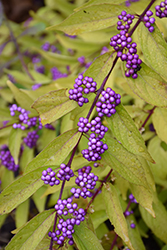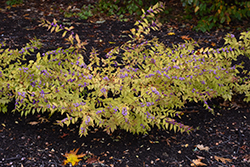It's all about ...
plants

Early Amethyst Beautyberry
Callicarpa dichotoma 'Early Amethyst'
Height: 4 feet
Spread: 4 feet
Sunlight:
![]()
![]()
Hardiness Zone: 5a
Description:
Popular for its beautiful amethyst-purple flowers and berries; graceful, arching branches; shrub is less leggy in full-sun and with low nitrogen fertilizer; may die back like a perennial in colder climates
Ornamental Features
Early Amethyst Beautyberry is primarily grown for its highly ornamental fruit. It features an abundance of magnificent lavender berries from late summer to late fall. It has lavender trumpet-shaped flowers along the branches from early to mid summer, which are interesting on close inspection. It has green deciduous foliage. The narrow leaves do not develop any appreciable fall colour.
Landscape Attributes
Early Amethyst Beautyberry is a multi-stemmed deciduous shrub with a shapely form and gracefully arching branches. Its average texture blends into the landscape, but can be balanced by one or two finer or coarser trees or shrubs for an effective composition.
This shrub will require occasional maintenance and upkeep, and is best pruned in late winter once the threat of extreme cold has passed. It has no significant negative characteristics.
Early Amethyst Beautyberry is recommended for the following landscape applications;
- Mass Planting
- General Garden Use
- Container Planting
Planting & Growing
Early Amethyst Beautyberry will grow to be about 4 feet tall at maturity, with a spread of 4 feet. It tends to fill out right to the ground and therefore doesn't necessarily require facer plants in front. It grows at a medium rate, and under ideal conditions can be expected to live for approximately 30 years.
This shrub does best in full sun to partial shade. It prefers to grow in average to moist conditions, and shouldn't be allowed to dry out. It is not particular as to soil type or pH. It is highly tolerant of urban pollution and will even thrive in inner city environments. This is a selected variety of a species not originally from North America.
Early Amethyst Beautyberry makes a fine choice for the outdoor landscape, but it is also well-suited for use in outdoor pots and containers. Because of its height, it is often used as a 'thriller' in the 'spiller-thriller-filler' container combination; plant it near the center of the pot, surrounded by smaller plants and those that spill over the edges. It is even sizeable enough that it can be grown alone in a suitable container. Note that when grown in a container, it may not perform exactly as indicated on the tag - this is to be expected. Also note that when growing plants in outdoor containers and baskets, they may require more frequent waterings than they would in the yard or garden. Be aware that in our climate, most plants cannot be expected to survive the winter if left in containers outdoors, and this plant is no exception. Contact our experts for more information on how to protect it over the winter months.
This plant is not reliably hardy in our region, and certain restrictions may apply; contact the store for more information.

